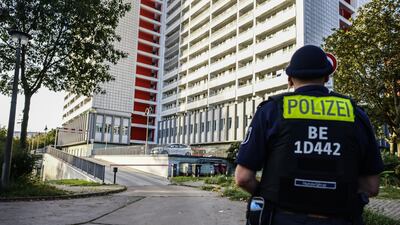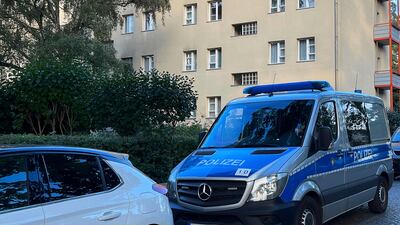Germany on Tuesday banned a neo-Nazi group called Hammerskins, after raids on a "skinhead elite" that allegedly used concerts as a recruiting ground for extremists.
Police swooped on the homes of 28 alleged extremists in a dawn operation against the German branch of a group founded in the US.
Authorities said the group's aim was to "propagate racial theory" associated with the Nazi era. A sub-group called Crew 38 was also banned.
US authorities were involved in investigating the German arm of the Hammerskins, which had about 130 members, according to Germany's Interior Ministry.
The ministry said members of the group saw themselves as the "elite of the right-wing extremist skinhead scene" and sought to "act out and strengthen their right-wing extremist worldview".
It said the group's main activities were concerts where non-members would be "confronted, ideologised and radicalised" with right-wing extremism.
The group allegedly sold "recordings of right-wing extremist and anti-Semitic music" and "items of right-wing extremist merchandise" in addition to organising concerts.
Interior Minister Nancy Faeser declared the Hammerskins illegal on the grounds of being "directed against the constitutional order" and "opposing the concept of international understanding".
She said the ban on the German branch of an "internationally active neo-Nazi organisation" was a "clear signal against racism and anti-Semitism". Using symbols of the Nazi era such as the swastika is illegal in Germany.
"Right-wing extremism remains the greatest extremist threat to our democracy," Ms Faeser said. "That is why we continue to act decisively to destroy right-wing extremist structures."
Tuesday's raids in 10 states are the latest in a series of crackdowns on the far right. Police last year uncovered what they said was a plot involving a minor prince and a former MP to stage a coup against the German state.

A second alleged plot involved kidnapping Germany's health minister and led to a university lecturer nicknamed "terror granny" being arrested. The cases shone a light on radicalism among Germany's middle and upper classes, in contrast to the skinhead scene that symbolised the neo-Nazi fringe in the 1990s and 2000s.
Germany has been rattled by a string of far-right attacks in recent years including a shooting at a shisha bar in Hanau in 2020 and the murder of a politician who supported refugees.
Political leaders have also been unnerved by a rise in support for the far-right Alternative for Germany (AfD), which has soared to second in the polls and could win a regional election for the first time when three states in the former East Germany vote next year.






